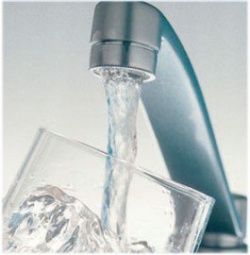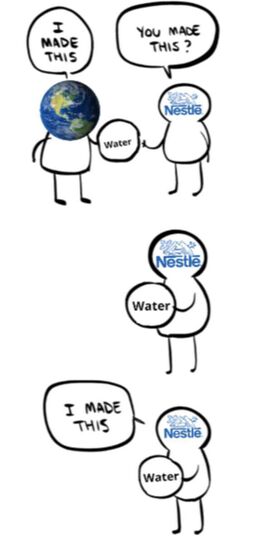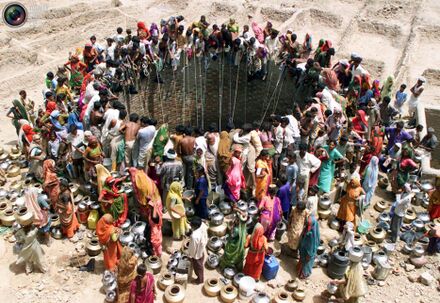Difference between revisions of "Water"
m (no new British reservoirs) |
|||
| (7 intermediate revisions by 3 users not shown) | |||
| Line 2: | Line 2: | ||
|wikipedia=https://en.wikipedia.org/wiki/Water | |wikipedia=https://en.wikipedia.org/wiki/Water | ||
|description=The most basic resource needed for life, and unavailable to more than 1 billion people worldwide. :-( ... | |description=The most basic resource needed for life, and unavailable to more than 1 billion people worldwide. :-( ... | ||
| + | |image=water.jpg | ||
| + | |powerbase=http://www.powerbase.info/index.php/Water | ||
| + | |wikiquote=http://en.wikiquote.org/wiki/Water | ||
}} | }} | ||
| − | More than 1 billion people lack access to clean drinking water.<ref>http://viralcircus.com/50-iconic-photos-that-will-forever-define-the-21st-century-so-far-everyone-has-to-see-this/</ref> | + | '''Water''' is essential for life. |
| + | |||
| + | ==Scarcity== | ||
| + | [[image:How nestle treats water.jpg|left|260px]] | ||
| + | More than 1 billion people lack access to clean drinking water.<ref>http://viralcircus.com/50-iconic-photos-that-will-forever-define-the-21st-century-so-far-everyone-has-to-see-this/</ref> [[Peter Brabeck-Letmathe]], the Chairman and former CEO of [[Nestlé]], stated that the answer to global water issues is [[privatization]] and that "access to water is not a public right".<ref>http://www.globalresearch.ca/the-privatisation-of-water-nestle-denies-that-water-is-a-fundamental-human-right/5332238</ref> | ||
| + | {{SMWQ | ||
| + | |text=Water is, of course, the most important raw material we have today in the world. It’s a question of whether we should privatize the normal water supply for the population. And there are two different opinions on the matter. The one opinion, which I think is extreme, is represented by the NGOs, who bang on about declaring water a public right. That means that as a human being you should have a right to water. That’s an extreme solution. The other view says that water is a foodstuff like any other, and like any other foodstuff it should have a market value. Personally, I believe it’s better to give a foodstuff a value so that we’re all aware it has its price, and then that one should take specific measures for the part of the population that has no access to this water, and there are many different possibilities there. | ||
| + | |subjects= | ||
| + | |authors=Peter Brabeck-Letmathe | ||
| + | |source_details=https://www.snopes.com/fact-check/nestle-ceo-water-not-human-right/ | ||
| + | }} | ||
| + | ===Deliberate shortage=== | ||
| + | It is a deliberate policy in many places to keep a shortage of water, possibly to promote the impression of a [[climate change]] crisis, and also to allow increased [[rent seeking]] with higher prices. A 2007 Communication from the [[European Commission]]<ref>https://eur-lex.europa.eu/LexUriServ/LexUriServ.do?uri=COM:2007:0414:FIN:en:PDF</ref> "addressing the challenge of water scarcity and droughts in the [[European Union]]", is based on the belief that Europe was facing a water crisis due to [[global warming]]. According to the Communication, the only way to meet the prospect of severe [[droughts]] was to encourage everybody to use water much more “efficiently”. Not once in the 14-page document is there any mention of the need to improve the [[reservoir|storage of water]]. From now on, the policy of member states must be, by every possible means, to reduce the use of water, not least by making it more expensive.<ref name=Booker>.https://archive.ph/huBQ5#selection-499.88-499.417</ref> | ||
| + | |||
| + | This policy was adapted by [[Britain]], where reservoir capacity has barely increased since water was privatized in 1989, despite a more than 10 per cent growth in population. Also, water companies have not plugged the leaks that are wasting nearly as much water every two years as is contained in all the reservoirs.<ref name=Booker/> | ||
| + | |||
| + | ==Threats== | ||
| + | [[image:tracking proximity.jpg|right|475px]] | ||
| + | [[Fracking]] can poison aquifers. It is strongly opposed by citizens in the US and the UK.<ref>https://www.rt.com/usa/fracking-protest-new-york-348/</ref><ref>https://www.dailymail.co.uk/news/article-2396623/Balcombe-fracking-protests-Were-winning-gloat-anti-fracking-activists.html</ref><ref>https://21stcenturywire.com/tag/fracking/</ref> | ||
==Global North== | ==Global North== | ||
| − | A 2016 paper in ''[[Environmental Science & Technology Letters]]'' claimed that millions of US citizens have been drinking toxic water for years.<ref>http://sciencebulletin.org/archives/4168.html</ref> | + | A [[2016]] paper in ''[[Environmental Science & Technology Letters]]'' claimed that millions of US citizens have been drinking toxic water for years.<ref>http://sciencebulletin.org/archives/4168.html</ref> |
| + | |||
| + | ===Fluoridation=== | ||
| + | {{FA|Water/Fluoridation}} | ||
| + | In many countries, fluoride salts are deliberately added to drinking water in an apparent effort to improve dental health. This policy however is coming under increasing focus as a cause for concern after the systemic toxicity of fluoride is becoming better understood. | ||
| + | |||
| + | ===Military bases=== | ||
| + | {{FA|Military base}} | ||
| + | Military bases do impact soil and groundwater. | ||
| + | |||
==Global South== | ==Global South== | ||
| − | [[image:water-well.jpg|left|thumbnail| | + | [[image:water-well.jpg|left|thumbnail|440px|Villagers in Natwarghad (Gujarat, India) draw water from a huge communal well.]] |
Ecological damage has let to the lowering of water tables and [[pollution]] of aquifers worldwide. This has often increased the profits of a few global [[trans national companies]], by imperilling the drinking water of large numbers of rural people and encouraged their migration to [[cities]]. | Ecological damage has let to the lowering of water tables and [[pollution]] of aquifers worldwide. This has often increased the profits of a few global [[trans national companies]], by imperilling the drinking water of large numbers of rural people and encouraged their migration to [[cities]]. | ||
| + | |||
| + | ==External links== | ||
| + | *[https://www.youtube.com/watch?v=ANsBNc3os6c Water Makes Money] a documentary about corrupt [[privatization]] of water, which occurs "everyday, all over the world".<ref>https://www.watermakesmoney.org/en/</ref> | ||
| + | |||
{{SMWDocs}} | {{SMWDocs}} | ||
==References== | ==References== | ||
{{reflist}} | {{reflist}} | ||
| − | |||
Latest revision as of 06:22, 13 August 2022
 | |
| Interest of | • European Policy Forum • Globalisation Institute • Institute for Public Policy Research • Robert F. Kennedy Jr • World Resources Institute |
| Subpage(s) | •Water/Fluoridation |
| The most basic resource needed for life, and unavailable to more than 1 billion people worldwide. :-( ... | |
Water is essential for life.
Contents
Scarcity
More than 1 billion people lack access to clean drinking water.[1] Peter Brabeck-Letmathe, the Chairman and former CEO of Nestlé, stated that the answer to global water issues is privatization and that "access to water is not a public right".[2]
“Water is, of course, the most important raw material we have today in the world. It’s a question of whether we should privatize the normal water supply for the population. And there are two different opinions on the matter. The one opinion, which I think is extreme, is represented by the NGOs, who bang on about declaring water a public right. That means that as a human being you should have a right to water. That’s an extreme solution. The other view says that water is a foodstuff like any other, and like any other foodstuff it should have a market value. Personally, I believe it’s better to give a foodstuff a value so that we’re all aware it has its price, and then that one should take specific measures for the part of the population that has no access to this water, and there are many different possibilities there.”
Peter Brabeck-Letmathe [3]
Deliberate shortage
It is a deliberate policy in many places to keep a shortage of water, possibly to promote the impression of a climate change crisis, and also to allow increased rent seeking with higher prices. A 2007 Communication from the European Commission[4] "addressing the challenge of water scarcity and droughts in the European Union", is based on the belief that Europe was facing a water crisis due to global warming. According to the Communication, the only way to meet the prospect of severe droughts was to encourage everybody to use water much more “efficiently”. Not once in the 14-page document is there any mention of the need to improve the storage of water. From now on, the policy of member states must be, by every possible means, to reduce the use of water, not least by making it more expensive.[5]
This policy was adapted by Britain, where reservoir capacity has barely increased since water was privatized in 1989, despite a more than 10 per cent growth in population. Also, water companies have not plugged the leaks that are wasting nearly as much water every two years as is contained in all the reservoirs.[5]
Threats
Fracking can poison aquifers. It is strongly opposed by citizens in the US and the UK.[6][7][8]
Global North
A 2016 paper in Environmental Science & Technology Letters claimed that millions of US citizens have been drinking toxic water for years.[9]
Fluoridation
- Full article: Water/Fluoridation
- Full article: Water/Fluoridation
In many countries, fluoride salts are deliberately added to drinking water in an apparent effort to improve dental health. This policy however is coming under increasing focus as a cause for concern after the systemic toxicity of fluoride is becoming better understood.
Military bases
- Full article: Military base
- Full article: Military base
Military bases do impact soil and groundwater.
Global South
Ecological damage has let to the lowering of water tables and pollution of aquifers worldwide. This has often increased the profits of a few global trans national companies, by imperilling the drinking water of large numbers of rural people and encouraged their migration to cities.
External links
- Water Makes Money a documentary about corrupt privatization of water, which occurs "everyday, all over the world".[10]
Related Quotation
| Page | Quote | Author | Date |
|---|---|---|---|
| Murray Rothbard | “It has always been a bit of mystery to me why left-environmentalists, who shriek in horror at a bit of Alar on apples, who cry "cancer" even more absurdly than the boy cried "Wolf," who hate every chemical additive known to man, still cast their benign approval upon fluoride, a highly toxic and probably carcinogenic substance. And not only let fluoride emissions off the hook, but endorse uncritically the massive and continuing dumping of fluoride into the nation's water supply.” | Murray Rothbard | 1993 |
References
- ↑ http://viralcircus.com/50-iconic-photos-that-will-forever-define-the-21st-century-so-far-everyone-has-to-see-this/
- ↑ http://www.globalresearch.ca/the-privatisation-of-water-nestle-denies-that-water-is-a-fundamental-human-right/5332238
- ↑ https://www.snopes.com/fact-check/nestle-ceo-water-not-human-right/
- ↑ https://eur-lex.europa.eu/LexUriServ/LexUriServ.do?uri=COM:2007:0414:FIN:en:PDF
- ↑ a b .https://archive.ph/huBQ5#selection-499.88-499.417
- ↑ https://www.rt.com/usa/fracking-protest-new-york-348/
- ↑ https://www.dailymail.co.uk/news/article-2396623/Balcombe-fracking-protests-Were-winning-gloat-anti-fracking-activists.html
- ↑ https://21stcenturywire.com/tag/fracking/
- ↑ http://sciencebulletin.org/archives/4168.html
- ↑ https://www.watermakesmoney.org/en/

